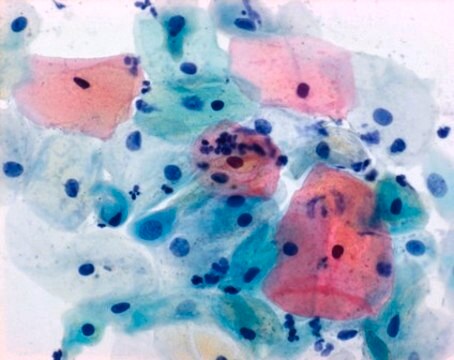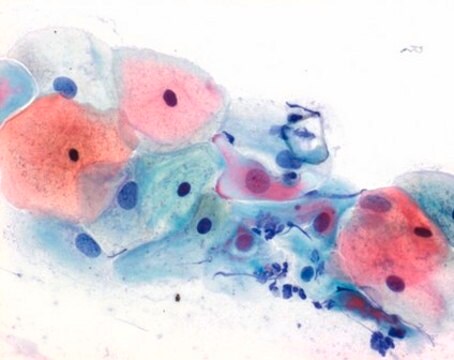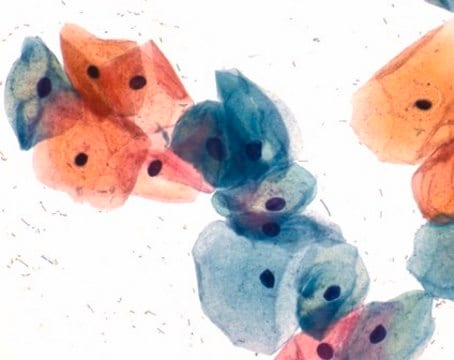おすすめの製品
品質水準
フォーム
liquid
体外診断薬
for in vitro diagnostic use
テクニック
microbe id | staining: suitable
pH
7.0-7.5 (20 °C in H2O)
転移温度
flash point 17 °C
密度
0.83 g/cm3 at 20 °C
アプリケーション
clinical testing
diagnostic assay manufacturing
hematology
histology
保管温度
15-25°C
関連するカテゴリー
詳細
Papanicolaou′s solution 2b Orange II solution - for cytology, is a ready-to-use solution used for human-medical cell diagnosis and serve the purpose of the cytological investigation of sample material of human origin, for example, cervical smears. Papanicolaou′s technique is the most used staining procedure for cytological specimens and is intended for the the staining of exfoliative cells in cytological specimens.
In the first step, the cell nuclei are stained either progressively or regressively with a hematoxylin solution, (Hematoxylin solution modified acc.to Gill II, (Product number 1.05175),
Papanicolaou′s solution 1a Harris hematoxylin solution, (Product number 1.09253) or Papanicolaou′s solution 1b Hematoxylin solution S, (Product number 1.09254). Nuclei are stained blue to dark violet. In the progressive hematoxylin staining method, staining is carried out to the endpoint, after which the slide is blued in tapwater. With the regressive method the material is over-stained and the excess of staining solution is removed by acid rinsing steps, followed by the bluing step. The structures of nuclei are more differentiated and better visible by the regressive method. The second staining step is cytoplasmic staining by orange staining solution, (Papanicolaou′s solution 2b Orange II solution, (Product number 1.106887) or Papanicolaou′s solution 2a Orange G solution (OG6), (Product number 1.06888)), especially for demonstration of mature and keratinized cells. The target structures are stained orange in different intensities. In the third staining step is used the so-called polychrome solution, a mixture of eosin, light green SF and Bismarck brown, Papanicolaou′s solution 3a polychromatic solution EA 31, (Product number 1.09271), Papanicolaou′s solution 3b polychromatic solution EA 50, (Product number 1.09272), Papanicolaou′s solution 3c polychromatic solution EA 65, (Product number 1.09270), or Papanicolaou′s solution 3d polychromatic solution EA 65, (Product number 1.09269). The polychrome solution is used for demonstration of differentiation of squamous cells. Papanicolaou′s solution 2b Orange II solution gives a more intense reddish staining result with mature and keratinized squamous cells than Papanicolaou′s solution 2a Orange G solution (OG6) - for cytology.
The 500 ml bottle provides 1500 - 2000 stainings. For more details, please see instructions for use (IFU). This product is registered as IVD and CE marked.
In the first step, the cell nuclei are stained either progressively or regressively with a hematoxylin solution, (Hematoxylin solution modified acc.to Gill II, (Product number 1.05175),
Papanicolaou′s solution 1a Harris hematoxylin solution, (Product number 1.09253) or Papanicolaou′s solution 1b Hematoxylin solution S, (Product number 1.09254). Nuclei are stained blue to dark violet. In the progressive hematoxylin staining method, staining is carried out to the endpoint, after which the slide is blued in tapwater. With the regressive method the material is over-stained and the excess of staining solution is removed by acid rinsing steps, followed by the bluing step. The structures of nuclei are more differentiated and better visible by the regressive method. The second staining step is cytoplasmic staining by orange staining solution, (Papanicolaou′s solution 2b Orange II solution, (Product number 1.106887) or Papanicolaou′s solution 2a Orange G solution (OG6), (Product number 1.06888)), especially for demonstration of mature and keratinized cells. The target structures are stained orange in different intensities. In the third staining step is used the so-called polychrome solution, a mixture of eosin, light green SF and Bismarck brown, Papanicolaou′s solution 3a polychromatic solution EA 31, (Product number 1.09271), Papanicolaou′s solution 3b polychromatic solution EA 50, (Product number 1.09272), Papanicolaou′s solution 3c polychromatic solution EA 65, (Product number 1.09270), or Papanicolaou′s solution 3d polychromatic solution EA 65, (Product number 1.09269). The polychrome solution is used for demonstration of differentiation of squamous cells. Papanicolaou′s solution 2b Orange II solution gives a more intense reddish staining result with mature and keratinized squamous cells than Papanicolaou′s solution 2a Orange G solution (OG6) - for cytology.
The 500 ml bottle provides 1500 - 2000 stainings. For more details, please see instructions for use (IFU). This product is registered as IVD and CE marked.
アナリシスノート
Suitability for microscopy (Vaginal smear): passes test
Nuclei: blue to dark violet
Cyanophilic cytoplasm: blue-green
Eosinophilic cytoplasm: pink
Nuclei: blue to dark violet
Cyanophilic cytoplasm: blue-green
Eosinophilic cytoplasm: pink
シグナルワード
Danger
危険有害性の分類
Acute Tox. 4 Dermal - Acute Tox. 4 Inhalation - Acute Tox. 4 Oral - Eye Irrit. 2 - Flam. Liq. 2 - STOT SE 1
保管分類コード
3 - Flammable liquids
WGK
WGK 2
引火点(°F)
62.6 °F
引火点(℃)
17 °C
適用法令
試験研究用途を考慮した関連法令を主に挙げております。化学物質以外については、一部の情報のみ提供しています。 製品を安全かつ合法的に使用することは、使用者の義務です。最新情報により修正される場合があります。WEBの反映には時間を要することがあるため、適宜SDSをご参照ください。
消防法
第4類:引火性液体
アルコール類
危険等級II
労働安全衛生法名称等を表示すべき危険物及び有害物
名称等を表示すべき危険物及び有害物
労働安全衛生法名称等を通知すべき危険物及び有害物
名称等を通知すべき危険物及び有害物
試験成績書(COA)
製品のロット番号・バッチ番号を入力して、試験成績書(COA) を検索できます。ロット番号・バッチ番号は、製品ラベルに「Lot」または「Batch」に続いて記載されています。
ライフサイエンス、有機合成、材料科学、クロマトグラフィー、分析など、あらゆる分野の研究に経験のあるメンバーがおります。.
製品に関するお問い合わせはこちら(テクニカルサービス)










